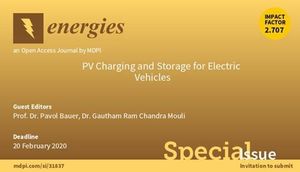Special Issue: PV Charging and Storage for Electric Vehicles

Two major trends in energy usage that are expected for the future are the increase in distributed renewable generation like solar energy and the emergence of electric vehicles (EV) as the future mode of transportation. At the same time, there are many challenges for the integration of these two technologies. Firstly, electric vehicles are only ‘green’ as long as the source of electricity is ‘green’ as well. Secondly, photovoltaic (PV) power production suffers from diurnal and seasonal variations, necessitating the need for energy storage technology. Thirdly, overloading and voltage problems are expected in the distributed network due to high penetration of distributed generation and increased power demand from charging of electric vehicles.
To overcome the above challenges, charging electric vehicles using distributed solar energy would be an excellent solution, resulting in net-zero emissions. Through vehicle-to-grid, V2G and vehicle-to-home/building, V2H/V2B; the EV can be used as a storage for PV and support the grid via ancillary services. With on-board solar panels, the driving range of electric cars can be increased by several km every day. Finally, intelligent control techniques combined with communication protocols can facilitate the intelligent charging of electric vehicles and offer of V2G services based on solar generations, grid congestion and energy prices. Finally, in places with a lack of grid access, solar powered charging can be the key enabler for the electrification of transportation.
The energy and mobility transition calls for novel technological innovation in the field of sustainable electric mobility powered from renewable energy. This Special Issue focusses on recent advances in technology for PV Charging and Storage for Electric Vehicles, and includes, but is not limited, to the following topics:
• Power electronic converter for (DC) charging of EVs from solar (with bidirectional capability to feed energy back to the grid)
• Investigation of the synergy between solar electricity generation and EV charging demand
• Innovative design of electric vehicles with on-board solar power for increased driving range
• Intelligent systems for off-grid (stand-alone) solar charging of EVs
• Power management techniques for solar EV systems to reduce grid congestion, increase solar self-consumption, reduce energy costs and increase grid stability
• Optimal sizing, location and control of energy storage to manage diurnal and seasonal solar variations in order to meet EV charging requirements
• Charging electric vehicles from solar energy in microgrids
• Recent developments in ICT protocols for solar powered smart charging of EVs (with V2G)
• Novel solar powered contactless EV charging system (with bidirectional power capability to feed energy back to the grid)
• Solar powered electrified public transportation (e.g., trams, buses, trains)
• Using the EV as energy storage for PV via Vehicle-to-X (e.g., V2G, V2H, V2B, V2L)
• State-of-the-art reviews on solar charging of EVs
Keywords: Energy storage, Electric vehicle, Power electronics, Energy management systems, Electric vehicles charging, Solar energy, Photovoltaic system, V2G, V2H, V2B, V2L, Distributed energy resources, Microgrid, Smart grid
Special Issue: PV Charging and Storage for Electric Vehicles
Special Issue Editors: Prof. Dr. Pavol Bauer, Dr. Gautham Ram Chandra Mouli